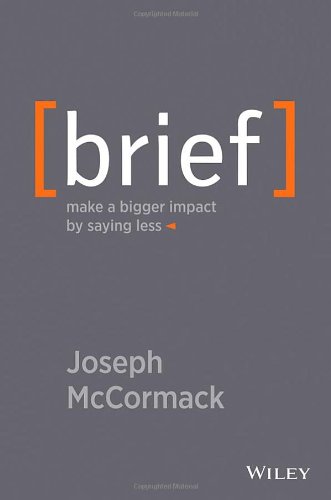Excerpts from the Joseph McCormack’s Book Brief: The Brevity Mandate
“Here are the daunting challenges we all face every day to be heard: Attention spans are in a tailspin. In 2000, the average attention span was 12 seconds and now it’s only eight. Professionals are interrupted 6-7 times an hour, often unable to get back to the task at hand. More than 43% abandon complicated or lengthy emails in the first 30 seconds. And the majority of people admit ignoring half the e-mails they get every day.”
“The more you say, the less people hear”
“The business world today is full of information overload and there is not enough time to sift through it. If you cannot capture people’s attention and deliver your message with brevity, you’ll lose them.”
“The discipline to capture and manage elusive mindshare now shapes and defines professional success. Shorter emails, better organized updates, and tighter and more engaging presentations are immediate indicators that you’ve got what it takes to succeed in an attention economy.”
“Getting to the point is a non-negotiable standard.”
Find book on Amazon here.

yes.
LikeLike
Me too!
LikeLike
Yup. Though I think it’s sad that we are losing attention span, interest in others, etc all in the name of multi-tasking. ‘Nuff said. 😉
LikeLike
Hmmmmmm
LikeLike
I’m still going to waffle. Then I know only attentive people with engage with me.
LikeLike
Wow. There’s a contra strategy! You go Ophelia.
LikeLike
“Brevity is the soul of wit.” Shakespeare in Hamlet
LikeLike
That right Todd!
LikeLike
Back to “less is the new more” mantra…..
This is absolutely true in our household. I tend to be a smidge long winded. If I have something important to express, it needs to be said first or I get tuned out rather quickly. Imagine that?!
LikeLike
Smidge, huh?
LikeLike
I know this to be true, I experience it every day, both on sending and receiving ends, and it makes me very sad. I just can’t help but feel that we’re sacrificing the texture of many of our experiences. Granted, I admit I don’t need to luxuriate in a work email, but the trend is pervasive, and I find myself struggling to hold fast on the things I DO want to savor as well. How do we get off this Merry-go-round?…..
LikeLike
Savor it at home. Tighten it up at work. How’s that for a formula?
LikeLike
I find it sad, too. And its not only with work emails/work related activities. So often, in social gatherings, where everyone is vying for attention, you can see when attention spans are wandering; not to mention the interruptions. Though there is something to be said about the B.I.F.F. method (brief, informative, friendly, firm) of sending emails.
LikeLike
Yes!
LikeLike
Yes!
LikeLike
Yes!
LikeLike
this explains a lot
LikeLike
Laughing. Confucius has us twisting…
LikeLike
🙂
LikeLike
True.
LikeLike
🙂 It is…
LikeLike
So this is my problem. I’m shut-up challenged. 🙂
LikeLike
I’m not touching THAT
LikeLike
A wise man once said, nothing. 🙂
LikeLike
(Crickets)
On Fri, Mar 14, 2014 at 12:00 AM, lead.learn.live. wrote:
>
LikeLike
More people should heed this.
LikeLike
yes!
LikeLike
Probably good for business but I’m not sure it’s good for writing fiction. For example, Donna Tartt’s The Goldfinch (close to 800 pages) is a lovely book with lots of details. Some reviewers thought it should be shorten; many others loved it. I loved the lull of it. Like a long, soothing dream.
LikeLike
Apples and Oranges Carol. Tartt’s book is magic.
LikeLike
Our poor brains…”information overload” is so true. The pace is so fast now that it becomes a struggle to even try to get back to something normal. 😦
LikeLike
When in Rome…
LikeLike
Do you think it would be rude to gift this book to some people?
LikeLike
No! You’d be doing them a favor. 🙂
LikeLike
Hummm…. I bet that my husband would recommend that I read this book 🙂
LikeLike
I’m not touching THAT.
LikeLike
okay I just bought it 🙂
LikeLike
:), let me know what you think. I have a few around me that might benefit… 🙂
LikeLike
Yep. Just had a long conversation with a dear friend, but still don’t know what the point was. One more gifted book.
LikeLike
LAUGHING.
On Thu, Mar 13, 2014 at 9:37 PM, lead.learn.live. wrote:
>
LikeLike
The more you say, the less people hear – That’s a new trend. Now that I have learned to speak I am asked to speak less…
LikeLike
What a paradox that is…
On Fri, Mar 14, 2014 at 1:24 AM, lead.learn.live. wrote:
>
LikeLike
Very interesting information! I’ve been wondering about this for poetry – keeping it shorter and more precise could be a lot more attractive. I’m working on it! 😉 We all have to read and also write soooo much today, there must be a limit as to how much our poor minds can take, not to forget the minutes/hours in a each day it all takes! 🙂
LikeLike
So true. We are like vacuums. Your comment reminds me of the following:
LikeLike